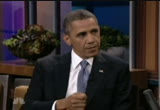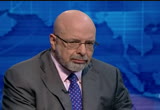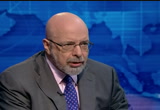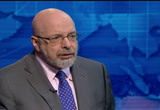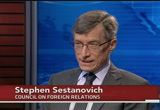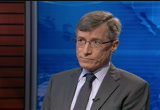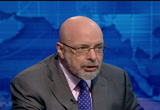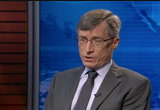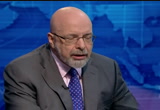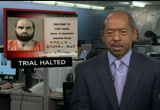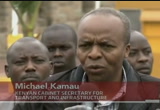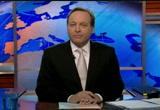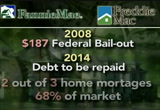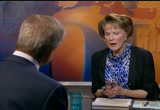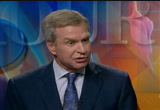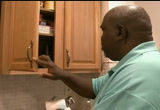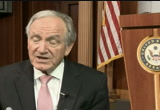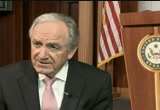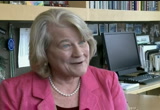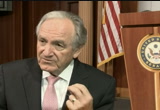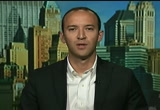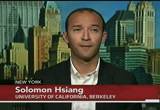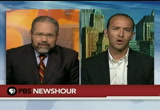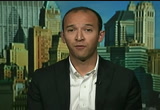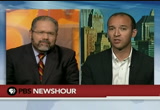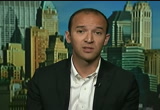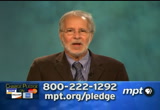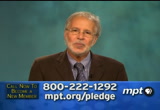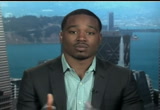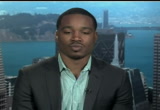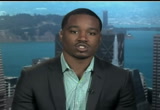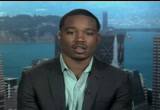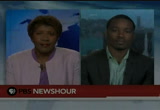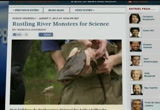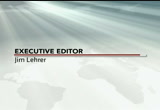tv PBS News Hour PBS August 7, 2013 6:00pm-7:00pm EDT
6:00 pm
have an extradition treaty with them, traditionally we have tried to respect if there's a law breaker or alleged law breaker in their country, we evaluate it, and we try to work with them. >> ifill: and today's white house statement acknowledged the snowden matter was indeed "also a factor that we considered in assessing the current state of our bilateral relationship. " in the leno interview, the president gave the russians credit for cooperation in the boston bombing investigation and other areas, but, he said: >> but there have been times where they slip back into cold war thinking and a cold war mentality, and what i consistently say to them and what i say to president putin is that's the past, and we've got to think about the future, and there's no reason why we shouldn't be able to cooperate more effectively than we do. >> ifill: tensions in the obama- putin relationship were clearly evident at the g-8 summit in ireland last june, after they clashed over syria.
6:01 pm
today, kremlin officials expressed their own disappointment at the u.s. decision to forego the summit. but they said president putin's invitation still stands. mr. obama still plans to attend the g-20 gathering in st. petersburg, next month, but has added a side visit to sweden instead. and secretary of state john kerry and defense secretary chuck hagel will meet with their russian counterparts in washington on friday. >> brown: was the president right to cancel the meeting? and where does this leave u.s.- russian relations? stephen sestanovich teaches international diplomacy at columbia university. he served in the state department during the reagan and clinton administrations. dimitri simes is president of the center for the national interest. he just returned from a trip to russia where he met with senior russian officials. welcome to both of you. stephen sestanovich was it the snowden asylum in the end that led to this and do you think it was the right move.
6:02 pm
>> i think it was a key factor in the decision but it wasn't the most important issue. what it did was force the administration to take careful stock of where the relationship stood. what's going on they had to ask, and is this meeting going to be a loser. i think they were right to conclude it was going to be a loser. that it was going to be a waste of time, at best, and at worst. >> brown: you told one of our producers earlier today you think president obama mishandled the situation with putin over snowden. explain what you mean by that and is that how russian officials that you've talked to felt. >> well, snowden came to russia not as invitation of the russian government. actually from what i was told, and it was confirmed to me by u.s. officials, that the u.s. government have informed the russians about snowden being on a plane from hong kong to moscow only when the plane had already
6:03 pm
left hong kong. so snowden was traveling to cuba. he was supposed to board a plane to cuba, a russian plane next day. then the u.s. government goes to the cubans and despite a rather difficult relationship, the cubans decided to talk with the united states and not allow snowden to go via cuba. so here is snowden at the russian airport. he's there for less than six hours and the secretary of state already was with putin about consequences. and the state department already express a strong consent. and senator schumer wants putin about are terrible implications for the relationship and says that putin put the knife in the american back. >> brown: to fast forward to today's action, this scene in russia as a clear diplomatic
6:04 pm
slight. >> i think that the way it is seen in russia as a logical progression of this situation, they obviously are not happy that it was consult. at the same time i think everybody recognizes that under the circumstances that was the right decision. including from the russian standpoint. because president obama came to moscow under the current circumstances with all this media criticism, pressure from the hill, he would have to conduct himself in a way that is a serious negotiating would be impossible. >> brown: we hear the president on jay leno and he's almost chiding russians for a cold war mentality. what do you make of that. what does that tell you about the state of thing? >> i think putin radiates a cold war mentality so a lot of other people have come to that conclusion. i'm not sure it's the best move to throw that in his face. there are many other factors
6:05 pm
producing this. but i think it's clearly the way the president reads the relationship right now and reads putin's view of the relationship. he sees putin and administration officials across the board see this as blocking any kind of real progress on a whole host of issues. >> brown: what are the other issues that are most important in this relationship? >> well there are two sets, in addition to snowden. the bilateral geo political issues, syria, iran, missal defense, nuclear arms reductions. there are, in addition to that, are the internal developments in russia that make it embarrassing for an american president to be shoulder to shoulder with putin without as dimitri sues having to duke it out with him. >> brown: from the russian view is something like this seen as a below to putin in the sense it denies him in this big moment. >> no.
6:06 pm
>> brown: or is it in fact boost him because it looks like he stuck to his guns. >> it looks like -- obama goes to the whitehouse that he would go. there will be an opportunity to cover a meeting at the sidelines at the summit. the whitehouse said that such a meeting was not plan. of course it was not planned at this point. >> brown: it's possible you think. >> i think between u.s. and russian senior officials is productive i think would be very difficult to avoid a discussion between putin obama in st. peter'sberg is not a big deal. >> i agree with every specific point he made about problems with the u.s. russian relationship. but there's a more fundamental problem and this is a problem that appears with policy not only with the russians but in general. i think at the end of the cold war were often developed a mind set that where is only super power but where master of the
6:07 pm
universe. and a dozen nations including the great powers i expect to talk about -- and once they don't do it as in the case of the snowden affair, we take it very very -- that is not helpful. all foreign policy effectiveness. >> brown: the puts it in a much grander scale. what's your reaction to a statement like that. >> i don't think president obama's northern policy is a master of the universe foreign policy. and i don't think he hasreated the russian account that way. he's actually approached it in a pretty transactional way trying to make progress on specific issues. and although it's clear there's no particular love lost between him and putin, i think the view that the administration had when putin came back was well let's see what we can do with this guy. and they built toward this meeting with the idea that if you can make progress on serious
6:08 pm
issues, it will be worth having a meeting. but they have been stuffed, stiffed essentially for the whole of this year. >> brown: so how would you characterize today the u.s. russian relationship. >> pretty empty. >> brown: empty. >> yes. it's a core of substance that could be there that is now missing and very negative atmospheric relating to internal developments in russia and bad personal vibes. what more do you want. >> brown: how would you characterize it? >> empty. going down at the expense of very important nation security in terms of the united states. it was a potential american light as we have seen in the case when in absence of adequate security dialogue with russia led which was avoidable. >> very serious consequences. serious consequences and we should do better but under the circumstances i'm glad that it
6:09 pm
was consult. >> brown: thank you both very much. >> ifill: still to come on the "newshour": changing how we pay for our homes; protecting the rights of people with disabilities; hot tempers in a warmer world and the gripping film that captures one man's final hours. but first, with the other news of the day. here's kwame holman. >> holman: a military judge in texas today temporarily halted the mass shooting court martial of army major nidal hasan after just one day. hasan is defending himself, but his standby attorney said he appears intent on getting sentenced to death. the lawyer asked that his own role be minimized. hasan has admitted killing 13 people and wounding nearly three dozen in 2009. he says he acted because america is at war with islam. the trial is expected to reconvene tomorrow. the deadly assault on the u.s. consulate in benghazi, libya has produced its first criminal charges. it was widely reported overnight that u.s. prosecutors have begun the process of bringing suspects to trial.
6:10 pm
word of the charges comes almost a year after the attack in benghazi, that killed ambassador chris stevens and three other americans. it's unclear how many people are included in the sealed complaint, or what the charges are, but the reports name ahmed abu khattala, the former commander of a benghazi-based militia group. khattala has denied involvement in the past, and did so again today. he insisted he's left the militia group and that he has not been questioned in the case. in washington, the u.s. justice department refused to comment, except to say the investigation is ongoing. but republican congressman darrell issa of california said anyone charged must be placed in u.s. custody without delay. issa and other republicans have accused the administration of neglecting security in benghazi and misleading the public about what really happened. authorities in yemen said today they've foiled an al-qaeda plot
6:11 pm
to take over strategic port cities in the south. they claimed it's the same plot that led the u.s. to close embassies in 19 cities across the muslim world. meanwhile, another suspected u.s. drone strike today killed seven al qaeda militants in southern yemen's shabwa province. in egypt, the military-backed leaders declared foreign efforts to mediate the country's political crisis have failed. they blamed the muslim brotherhood, which backs mohammed morsi, the ousted president who remains in custody. egypt's interim prime minister went on state t.v. to warn islamist protesters that the decision to dismantle their camps in cairo is irreversible. >> we asked them once more to leave quickly and return to their homes and work without resistance. those who do not have blood on their hands, the state promises to provide them with free transportation. the cabinet warns against the
6:12 pm
continuing dangerous escalation and inassignment from among the brother hoods. >> holman: the muslim brotherhood rejected the warnings, and said protesters are not concerned about talk of clearing their sit-ins by force. a small fire got out of control today at kenya's main airport in nairobi, the busiest in east africa. the extensive damage grounded international flights and roiled schedules across the continent. the entire airport was closed for a time, as firefighters battled the blaze. inbound flights were rerouted to the coastal city of mombasa. when the airport re-opened later, it was only for domestic and cargo flights. kenyan officials announced plans to convert a domestic flight area into an international terminal. >> from tomorrow we will be preparing this unit, unit three as an international terminal for departure and arrival we have started pitching tents on the
6:13 pm
air side for handling departing passengers. >> holman: the cause of the blaze was under investigation, but officials said there was no initial indication of terrorism. tensions between the two koreas eased somewhat today. communist north korea announced it is reopening an industrial park that is run jointly with south korea. the park closed in mid-april amid threats by the north to retaliate against washington and seoul for international sanctions. formal talks on future operations at the industrial site are scheduled to begin august 14. on wall street today, the dow jones industrial average gained lost 48 points to close at 15,470. the nasdaq fell 11 points to close at 3,654. those are some of the day's major stories. now, back to jeff. >> brown: president obama returned to the topic of housing today. margaret warner has that. >> warner: the president today vowed to push congress to pass broad housing reform by the end of the year. one of his key proposals: wind down the roles of freddie mac
6:14 pm
and fannie mae. the two massive mortgage finance companies taken over by the federal government in the depths of the housing crisis. in phoenix yesterday, he endorsed a senate proposal to-- quote-- "end freddie and fannie as we know them:" >> first, private capital should take a bigger role in the mortgage market. i believe that while our housing system must have a limited government role, private lending should be the backbone of the housing market, including community-based lenders who view their borrowers not as a number, but as a neighbor. >> warner: freddie and fannie have been in government receivership since failing nearly five years ago... costing the government $187 billion to bail them out. now they are turning a profit.. and are on track to fully repay that amount by 2014. two out of every three new home mortgages today are guaranteed by freddie and fannie, 68% of the market. to explain how would the
6:15 pm
change that landscape we turn to guy cecala publisher of "inside mortgage finance"... a housing industry research publication. welcome mr. cecala. the president has been talking since taking office in 2009 about reviving the housing and mortgage market. do you see these statements this week as significant. >> yes. the first time in several years that we've heard position advanced by the whitehouse and somewhat significant in that he's talking about specifically changing the existing system we have of closing down fannie mae and freddie mac and coming up with something to replace them but maintaining some sort of government presence in the housing market. >> warner: how would that work. he's not proposing ending all government guarantees is that right. >> yes. he's talking about a senate proposal which is bipartisan at least in the senate that talks about setting up a federal mortgage insurance corporation that would operate somewhat like the federal deposit insurance corporation in that it would collect money from lenders and
6:16 pm
in return give them a government guarantee. >> warner: it would be fees paid. >> exactly. >> warner: explicitly. what is the thinking behind this as to how this would prevent the kind of unscrupulous lending to unqualified borrowers that really precipitated the whole housing crises? >> well the legislation specifically says the only type of mortgages that can go into these new securities insured by the federal mortgage insurance corporation would be super safe. they would have to be, couldn't have any features that were considered predatory or anti-consumer. so they would be the safest mortgages that we'd have. >> warner: we're really talking about tighter regulation. >> it's tighter regulation but it's modeled after the dodd-frank act and it's pretty much a regulation that the consumer financial protection bureau has already finalized and put in place to take effect in early 2014. >> warner: now hasn't tighter
6:17 pm
standards already been put in place just anecdotally. there are many reports about how much more documentation is required. >> it's a combination of things. certainly the standards are tighter that would be put in place by government agencies and to some extent regulators. >> warner: does that include freddie and fannie. >> yes, exactly. is issue too is lenders are imposing suffer standards on top of those because they're concerned about the losses they've been asked to compensate the government for. fannie and freddy is required in the buy back mortgages, hud and the fha to indemnify them from losses. they want to make the mortgages as safe as possible instead of having a 650 credit score let's ask for a 750 credit score that type of thing. >> warner: haven't there been people been arguing that's actually a good thing. >> it's a good thing if you want super safe mortgage market environment but you're also talking about a much smaller
6:18 pm
pool of americans who are qualifying to buy a home. >> warner: even now you're saying. >> yes, exactly. you know, compared to 2005 or 2006 we're talking 30 to 40% le. >> warner: our private banks are commercial banks interested do you think in extending mortgage loans. is that private market that currently interested, it's a private securities market interested in buying and selling mortgage backed securities like fannie and freddy do without government guarantees. >> there is a non-agency mortgaged back securities market that exist now but it's a fraction of the size of the government mortgage securities market and it's because it doesn't have a government guarantee and investors are very skittish since the sub-prime crises and everything else that if they buy these securities that there will be losses on them. >> warner: and so are you saying that there's question out there just among the industry
6:19 pm
you cover about whether the private industry would step up to them. >> there certainly is and that's why what obama is endorsing essentially is maintaining a government guarantee but having it as catastrophic insurance effectively and that's private lenders would have to step up and pay a certain level of the first losses. but the security they would be selling would have a complete government guarantee. >> warner: so what would this mean for consumers? would be borrowers would be sellers. >> in theory it means that interest rates are probably going to be higher than they normally would be. freddie and fannie maintained a huge mortgage securities market, they purchased them, they provided for a lot of liquidity. you certainly wouldn't have that at least not initially in that. so that would probably result in higher interest rates. >> warner: would there also be higher fees actually from borrowing? >> probably not because right now borrowers don't realize it
6:20 pm
but lenders pay a fee to fannie mae and freddie mac to guarantees mortgages and that fee is always passed right on to borrowers. >> warner: what would be so different. if they're already paying these fees now? >> it would be the value of the securities themselves and how much that would effectively fetch in the securities market by other investors. >> warner: let me go back to something that the president said he wanted to preserve and that is the 30-year fixed rate mortgage. actually a lot of more people would turn to after the housing level burst. what's the future of that under this new system? >> that's one of the reasons why i think the president's supporting some role for the government because it would be very hard to preserve the 30-year fixed rate mortgage unless you can package it into a mortgage-backed security that had a government guarantee and that investors would want. because let's face it, interest rates are probably rising over the next few years and most people, banks, don't want to hold a fixed rate mortgage on their books they would rather have an adjustable rate
6:21 pm
mortgage. >> warner: very briefly as a veteran of watching these battles over fannie and freddy over these years, how do you assess the prospects on the hill. >> slim. this is going to be controversial. the republicans in the house have already staked out a position they don't want any government involvement in the mortgage market going forward. they like the idea of winding down fannie and freddy but they don't want anything to replace it. >> warner: guy cecala, thank you. >> you're welcome. >> ifill: it's been 23 years since the "americans with disabilities act" became law. judy woodruff reports on the advances and the setbacks in the continued fight to implement the landmark legislation. >> reporter: five days a week, 54-year-old ricardo thornton can be found at washington d.c.'s martin luther king junior memorial library. born in the district of columbia, he has worked here for more than three decades.
6:22 pm
and his full-time employment is just one of the accomplishments thornton has used to rise above a label placed on him as a child. >> i am a person with mental retardation. when you have that label, where ever you go, "oh he has a disability, it's mental." oh, come on you going to be with him? that kind of trust wasn't there. >> reporter: last year, thornton moved into a two-bedroom house in washington with his wife donna of 29 years, who also has a developmental disability. while they still receive some support for daily living needs and light supervision from a not-for-profit agency, having a place of their own was a dream come true. they had lived in small apartments for more than 20 years, where they raised their son. so what does it mean now to have your own home? to be on your own? >> it's beautiful.
6:23 pm
it means that i'm part of a community that loves me. >> reporter: thornton had a much different living situation as a child and young adult. moving through various institutions for those with disabilities. >> some were treated bad and some were treated good. you know, i felt that i was being that i committed a crime and i'm doing time for a crime i never committed. and why? >> reporter: that experience was common before the "americans with disabilities act" was signed into law 23 years ago by president george h.w. bush. the civil rights measure made it illegal to discriminate against people with disabilities, including by unnecessarily forcing them to live in segregated settings in order to access government services. but the states, who have much of the responsibility to provide care for those with disabilities, moved slowly to comply. that's because of limited funds
6:24 pm
and-- what experts say-- is a lingering bias. jennifer mathis, director of programs at the bazelon center for mental health law in washington. >> change is hard. because you have years and years of service systems that were premised on a different vision about the capabilities of people with disabilities that didn't envision people with disabilities as living regular lives the same kinds of lives that the rest of us, having families, having jobs. >> reporter: so even after the a.d.a. became law, many people with disabilities were not being moved by the states out of large institutions and into homes and community-based programs. in response, in 1999, the supreme court handed down the "olmstead decision," reaffirming the a.d.a.'s integration mandate. it held that unjustified segregation constitutes discrimination. and it served to push states
6:25 pm
into compliance. 14 years later, the picture has improved. states have made progress nationally and they have reduced the share of medicaid spending for individuals with disabilities living in institutions like nursing homes and special hospitals. but as senator tom harkin, who co-authored the a.d.a., discovered through a new report he commissioned, most states are still not providing the home and community-based services people with disabilities need. >> this is a civil rights issue, not a social welfare issue. and so states see it as a social welfare issue, they have a hold- over bias of institutionalization and nursing homes have powerful lobbies-- can i add that-- in the states. so things tend to go on like they've always been going on. >> reporter: the report harkin commissioned found that: hundreds of thousands of people remain on waiting lists for home
6:26 pm
and community-based services. people younger than 65 are being isolated in nursing homes with wide disparities from state to state. and it's happening even though there's overwhelming evidence that finds home and community care costs less than institutional care. harkin compares the situation facing those with disabilities to racial discrimination. >> think about segregation. people with disabilities are still segregated in our society and that's wrong. it's wrong morally, its wrong economically, and it's wrong in compliance with the americans with disabilities act. i think we need to have a federal determination that that person has that federally protected right. >> reporter: diane rowland studies medicaid spending as the executive vice president of the kaiser family foundation. she says most states have begun to move in the right direction, but they often find they are constrained by limited resources.
6:27 pm
>> we haven't seen as much there was also an escape clause that was part of the olmstead decision that said that budgetary pressure at the state level could be taken into account into developing the plans for moving forward. so you've always had this tension between what is right, what is a right of the individuals and whether the state has the fiscal capacity and implements it in the fullest form that it was intended. >> reporter: rowland and others yet another hurdle: a big chunk of the funding for those with disabilities comes from state medicaid programs. >> it leaves very serious variations across the states and depending on where you live your options may be very different, which is one of the harsh realities of the way the medicaid program operates in the states and it leaves people with disabilities who want to leave an institution needing a strong advocate to help get them out >> reporter: despite the slow progress, jennifer mathis of the
6:28 pm
bazelon center says the department of justice is stepping up its role in ensuring compliance. >> during this administration the justice department really made this issue a priority and has aggressively, assertively i think that states are starting to see the integration mandate in a different light then they did say seven years ago. where i think there wasn't a lot of law, there were many fewer lawsuits. >> reporter: senator harkin insists it will take more than lawsuits, possibly new legislation with stronger enforcement. but he says public attitudes about people with disabilities have to change, too. >> we are one accident away, one illness away from being disabled. we, those who are not disabled, we have to start thinking would we want to be institutionalized if that accident happened to us? if that illness happened to us and now we're disabled?
6:29 pm
is that what we want for ourselves? i tell you, you ask anyone that well how about making sure we don't have it for people who are disabled right now. >> reporter: however long it takes, ricardo thornton says he will continue to advocate for change. >> i feel that everyone should be given an opportunity. it's time for institutions to close. it's time for new things to happen. this house here is a blessing to us. i got a wife, i love her and i have a son and i'm seeing him grow and a family. so i'm really enjoying life and want to see other people enjoy life. >> reporter: thornton says a big part of enjoying life is his work at the library, adding he has no plans to retire any time soon. >> brown: now, reading the thermostat to predict a violent climate. ray suarez has the story. >> suarez: hot temperatures
6:30 pm
and changes in the climate are strongly linked to human violence. that's the conclusion of a new study recently published in the journal of science. researchers of princeton and the university of california at berkley poured through date of data from a variety of disciplines. they found moderate increases more changes in rainfall increased conflict on all levels. both in ancient times and our own. in wealthy societies and developing one. solomon is the lead author of the study and he joins me now. professor i think we've b accustomed in recent years to observing how weather changes natural systems whether it's water ways or migratory bird patterns or insect activity. but how do you measure, how do you correlate human behavior to temperature. >> in recent years a variety of research groups have assembled really useful data sets where we have records of how many conflicts occurred in different
6:31 pm
locations. in some cases we're just looking at things like the fbi files that record how many assaults or rapes or murders happen in the u.s. on a given day. we link that kind of data to historical data on the climate, so temperature, rainfall. and we try to understand how a change in the environment can lead to human response on the ground. >> suarez: so see if i understand this correctly. you're measuring a lot of different kinds of human response but is it just the temperature that could be forcing these changes? i mean the temperature may have an effect on how much drinkable water there is around, temperature may have an effect on how much food there is to eat in a given community. >> absolutely. so there are in fact many hypotheses, many mechanisms that people think might help connect changes in the environment, changes in the temperature or extreme rainfall. the conflict outcomes that we observe.
6:32 pm
sometimes we think direct exposure to heat sometimes does change human psychology. we observed in the laboratory if you put people in a room and raise the temperature they actually change how they behave towards others. as you suggest there's economic mechanisms as well that are incredibly important. so you can have crop failures and extremely high temperatures and that leads to all sorts of changes, changes people's insentives to perform in the labor market in comparison to more violent activities and it also changes how people migrate, see prices and all those things can have an influence on human conflict which is a very complex phenomena. >> suarez: is there an amount of increase where you see things intensify or start to take off. is there a threshold where you see your observable results more strongly? >> so it turns out when we look at temperature, it actually looks as though the relationship is pretty continuous. so pretty much wherever you are in the modern world, we tend to
6:33 pm
observe that even increasing the temperature by a little bit leads to higher levels of conflict. but if we look at rainfall data, there does tend to be these sort of threshold effects where very extremely high levels of rainfall or extremely low levels of rainfall tend to be damaging. that's consistent with the economic idea you've been pointing out particularly because extreme rainfall is very bad for agriculture. >> suarez: it's interesting that you try to do this retrospectively. is there reliable enough data both on human activity and on the natural world to look back into the past and say uh-huh, here's a time where rising temperatures can be correlated with increased human violence? >> data quality is always an issue whenever you do any sort of retrospective study. we looked across 60 studies and some of them go way back in time, thousands of years. but half the studies come from the modern era. these are studies of data where the populations that are being
6:34 pm
observed are populations from 1980 to the present. in those situations, we think the data is a very high quality. and we are able to actually observe stronger associations like you suggest. >> suarez: other examples of the opposite, places that literally cool off when they cool off? >> so, yes. when we look at these sorts of relationships, what we're actually saying is that higher temperatures tend to be worse, cooler temperatures tend to be better. in the modern world. if we go back to the time in europe during the ice age for example you'll see that cold events during these cold epochs and cold locations also tended to lead to more conflict between populations. that seems to be a general pattern through many studies that look back in time far enough. in the modern world we're not in that kind of ice age and we tend to seat higher temperatures. >> suarez: conflict is a pretty big word and i suspect a lot of things could live under that broad umbrella. what kind of effects were you
6:35 pm
looking for when you were looking for things to measure. just the examples of assault, crimes, murders? what exactly is conflict. >> so when we were trying to look at all different types of human conflict, sort of organize it and help us understand better what are the general patterns, we broke conflict down into three type of conflicts. we look at interpersonal conflict, the conthoracic between individuals, things like murder, assault, rape, domestic violence. then we also looked at intergroup conflict. that conflict between groups of populations. sometimes those could be ethnic, riots. those could be things like political oppression or civil conflicts. then there's a third and very extreme category that we looked at which is really the collapse of civilization and the break down of governing institutions. now very few of those events have occurred in modern times but those scenarios are particularly interesting because they sort of represent extreme
6:36 pm
scenarios. you can think of things like the collapse of the mayan empire or other empires around the world that coincided with extreme things. >> suarez: solomon thanks for joining us. >> thanks for having me. >> ifill: we'll be back shortly with a conversation with the director of "fruitvale station." but first: this is pledge week on pbs. this break allows your public television station to ask for your support. and that support helps keep programs like ours on the air.
6:43 pm
>> ifill: oscar grant's name may never have been known if he had not been killed just hours into the new year of 2009. now, the story of the 22-year- old man, who'd spent new year's eve celebrating with friends in san francisco, has become the subject of a critically acclaimed new film "fruitvale station." grant, who was unarmed, was shot dead by a police officer on an oakland rail platform. the fictionalized account follows him through his last day.
6:44 pm
>> five, four, three, two, one. >> who is home. >> what is going on? >> hey, oscar. how are you. >> good, i'm good. happy new year. >> happy new year. >> oscar. oscar from ... >> get off the train now. >> are you still on the train. >> why don't you tell me what is going on? what is the problem? what are you doing. >> oh my gosh. >> that won't be good, won't be good. ryan coogler wrote and directed fruitvale station. it is his first and feature length film.
6:45 pm
he joirnz us from san francisco. thank you for joining us. you tell us about a polarizing story in a humanizing way about this individual oscar grant. why do you choose to tell his story this way? >> for me what was really important to tell a story from the perspective of the people that knew him the best. after the situation happened and oscar lost his life, it became very politicized. people should have known what he was and many ways made him what they wanted him to be. some people wanted to make him out to be a saint and martyr. he became a symbol for whatever reasons they had. and other people wanted to make him just every bad mistake he made in his live as just a criminal or a felon he's just a drug dealer and got what he deserved on that platform. for me it was something i wanted to give to the heart of the people who new him the best before this situation. every one of us, every human being in the world, just doing their every day lives, his mom,
6:46 pm
his girlfriend his daughter. it's all very interesting telling the story from the perspective of all the relationships. >> ifill: you are yourself an african american young man not yet 30 years old. did this story resonate with you in a very special way. >> absolutely. i was born and raised here my whole life and oscar was the same age when he was killed. the first time you saw the footage i couldn't help to think how much he looked like me and his friends looked like my friends. i had that close proximity to that just from the standpoint being from the bay area, looking like the guy and moving through the same situation he's been through. i thought about they have a personal leave. what if i didn't make it home to the people i loved most in my life from my very necessary situation. so definitely affected me. >> ifill: as a filmmaker you had pretty amazing success first time out of the box here at sun
6:47 pm
dance, at caan and wonderedded if you expected this to read ate with a bigger audience. >> how it's being received and accepted by audiences domestic and abroad. for me it was always a making something that was very personal to myself and very important. it was a story that had resonance in the bay area here where oscar was from and where it took place. it was for me and all the film makers involved to really tell the story as specific as we could and had it be about universal thins. it's about drama relationships. everybody knows what it likes to be young and maybe has damaging effects on people they have around him which was the situation oscar was going through. it's like people who mean the world to you and how it has an effect on people's lives. i think they are really getting to the heart of that stave is what we hope to connect with
6:48 pm
people outside of oscar's demographic. we hope those things will hopefully connect. we have no idea they would. >> ifill: talking about oscar's demographic was a week after george zimmerman's verdict and people everywhere in the theatre where i was was sobbing watching this film even though they know how it ended. how this trayvon martin affected the way people see this film. >> i can't speak to that. probably as a film maker it was very ironic that the verdict came down the week our film bought released. we were working on the film before trayvon was killed, you know. that tragedy wouldn't have happened and deeply affected me back in february, it affected a lot of people and i think the verdict had a similar affect on a lot of people that was tuned
6:49 pm
in to watching it. but it wasn't in our plan at all to have the film be coming out to be released around that moment when we were watching that trial and in many ways, i think people can see parallel. to me it was always about oscar's story's always about the loss of attention of this young man's life. showing young african american males lose their life to violence in this country every day. i think because of something that was in the media it was a situation of young african american men losing their life drew parallels there. >> ifill: i found the movie very affecting and thank you for making it and good luck on your next project. ryan coogler, director and writer of fruitvale station. thank you for joining us. >> thank you so much for having me. i really appreciate it. >> brown: again, the major developments of the day: president obama scrapped a planned summit in september with
6:50 pm
russian president vladimir putin. it came a week after moscow granted asylum to edward snowden, the national security agency leaker. egypt's military-backed leaders declared foreign efforts to mediate the country's political crisis have failed. and a military judge at fort hood, texas, temporarily halted the court martial of army major nidal hasan. his standby attorney warned hasan is deliberately trying to get the death penalty. >> ifill: online, rustling up river monsters for scientific research. kwame holman has the details. >> holman: hellbender salamanders are long, flat, slippery amphibians that have been around for millions of years, yet we know very little about them. a group of researchers wrestles them from riverbeds in the hopes of understanding the population and what it can tell us about their environment. read our science wednesday report. and for all you dog lovers, we have the story-- along with photos-- of a golden retriever pilgrimage to the scottish highlands, the birthplace of the breed. all that and more is on our
6:51 pm
how can u.s. cities ensure economic health. join us for a twitter chat tomorrow and weigh in. use the hash tag newshour chat. all that and more is on our website newshour.pbs.org. gwen? >> ifill: and that's the "newshour" for tonight. on thursday, we'll look at why getting old doesn't mean leaving a cherished life behind as more seniors age in place. i'm gwen ifill. >> brown: and i'm jeffrey brown. we'll see you online and again here tomorrow evening. thanks for joining us. good night. >> major funding for the pbs newshour has been provided by: ♪ ♪ moving our economy for 160 years. bnsf, the engine that connects us.
6:52 pm
>> support also comes from carnegie corporation of new york, a foundation created to do what andrew carnegie called "real and permanent good." celebrating 100 years of philanthropy at carnegie.org. >> and with the ongoing support of these institutions and foundations. and... >> this program was made possible by the corporation for public broadcasting. and by contributions to your pbs station from viewers like you. thank you. captioning sponsored by macneil/lehrer productions captioned by media access group at wgbh access.wgbh.org erertz
6:56 pm
6:57 pm
the world in comfort. midsummer strategy, august historically one of the worst months for stocks but is there a smart way for you to invest during the dog days of summer as others head to the beach? >> power players, in a huge switch the u.s. is a refiner to the world and a hand full of companies are helping lead the charge. shopping spree, we all like the idea of buying american products but finding them is a different story. so we hit the mall to see for ourselves in our special series made in america. we have all that and more tonight on "nightly business report" for wednesday, august 7th. good evening everyone and welcome. call it the summer stumble. it doesn't qualify as a swoon or full fledged sale off yet but u.s. stocks fell dropping like dominos. japan notably declined 4% as the yen rose against the dollar.
6:58 pm
here in the u.s. investors seemed unsettled by reoccurring fed chatter thinking the u.s. may scale back stimulus in september maybe not. if not, maybe the end of the year. either way, investors didn't like it. the dow dropped 48 points and the nasdaq to 3654 and the s&p 500 closed at 1690 and change. since 1987, august is the worst month for stocks, so what should investors do? joining us with his thoughts, global market strategist at jp morgan funds. andres there is a summer lull. what is the smart thing for investors to do? do you buy, sale, just sit tight? >> for the active investor, short-term investment horizon
6:59 pm
nobody wants to be a hero this august considering how strong the markets rallied. if you're a long-term investors it opens opportunities, for instance european equities we think they under performed the u.s. equity market and economies not in good shape but going from really bad to just bad and that momentum is what you look for to generate outside returns in the years to come. >> how much of a typical investor, and i realize there is no such thing as a typical investor but how much of a typical investor's portfolio should be in overseas securities? >> that's a great question. it matter what is your risk aversion is. european equities will be more volatile. there is more uncertainty not only about their economy but earnings. that's a reason i think there will be a higher expected return. having said that, if you look at the u.s.,
318 Views
IN COLLECTIONS
WMPT (PBS) Television Archive
Television Archive  Television Archive News Search Service
Television Archive News Search Service 
Uploaded by TV Archive on

 Live Music Archive
Live Music Archive Librivox Free Audio
Librivox Free Audio Metropolitan Museum
Metropolitan Museum Cleveland Museum of Art
Cleveland Museum of Art Internet Arcade
Internet Arcade Console Living Room
Console Living Room Books to Borrow
Books to Borrow Open Library
Open Library TV News
TV News Understanding 9/11
Understanding 9/11